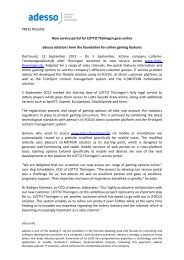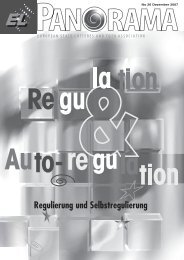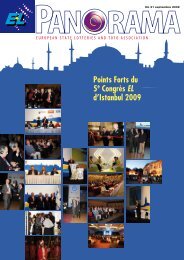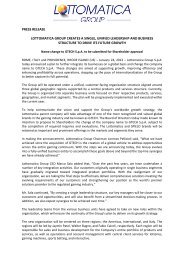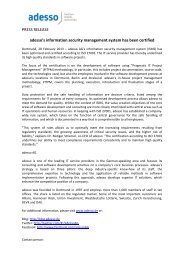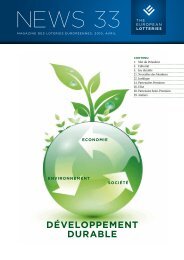EUROPEAN STATE LOTTERIES AND TOTO ASSOCIATION
EUROPEAN STATE LOTTERIES AND TOTO ASSOCIATION
EUROPEAN STATE LOTTERIES AND TOTO ASSOCIATION
You also want an ePaper? Increase the reach of your titles
YUMPU automatically turns print PDFs into web optimized ePapers that Google loves.
Prof. Viren<br />
Prof. Matti Viren<br />
University of Turku, Department of<br />
Economics, Finland.<br />
Gaming markets are changing rapidly.<br />
This change manifests itself in institutions,<br />
the nature of games and in the volume<br />
and pricing of gaming. Formally, the<br />
institutional set-up has not changed very<br />
much during the past ten years. However,<br />
under the surface a great deal has<br />
happened. The most important engine of<br />
change, of course, has been the internet,<br />
which has enabled cross-border gambling<br />
in an unprecedented scale.<br />
Although we do not know the volume of<br />
cross-border sale exactly, we can use the<br />
estimates of a recent survey conducted<br />
across European Lotteries 2 . According to<br />
this survey, cross-border sales constitute<br />
an average of 7.4 percent of the gaming<br />
companies’ total sales. It is not a strikingly<br />
big figure but when we look at the individual<br />
games, we are faced with certain very<br />
high percentages. For example, while<br />
cross-border sales in lotto are around<br />
one percent, their share in sports betting<br />
amounts to up to 39 percent. From the<br />
point of view of existing companies andgovernments,<br />
the situation is alarming<br />
already because it entails major losses of<br />
revenue. Governments are also concerned<br />
about tax revenue: private bookmakers do<br />
not pay taxes on their cross-border sales,<br />
which, in turn, is detrimental to the governments’<br />
fiscal position.<br />
Whatever will happen, it is clear that we<br />
are moving towards more competitive<br />
markets and prices will fall (accordingly,<br />
the prizes and the payout ratios will in-<br />
Gaming in the new market environment:<br />
what do we know about the consequences<br />
of the changes? 1<br />
crease).Thus, while the average payout<br />
ratio of the European companies is now<br />
at 53.3 percent as compared to 48.5 percent<br />
ten years ago, all companies expect<br />
it to increase substantially in the next<br />
ten years. According to the current European<br />
state lotteries, if all restrictions<br />
were abolished, the payout ratios could<br />
reach 70 percent. This would obviously<br />
increase the volume of sales. Using the<br />
lotteries’ subjective estimates as a benchmark,<br />
we could say that such a change<br />
in the payout ratios would increase the<br />
overall demand by almost one third.<br />
Quite clearly, such changes would show<br />
in all indicators: expenditures, production,<br />
employment, advertising and, maybe<br />
most importantly, problem gambling.<br />
It is certainly worth trying to analyze the<br />
nature and magnitude of these effects in<br />
more detail. It is not easy and we cannot<br />
always arrive at unambiguous results;<br />
yet some results are quite obvious. Very<br />
briefly, we could state:<br />
• Gambling is good; its overall effect on<br />
welfare is clearly positive. Hence, there<br />
is no need to prohibit gambling altogether,<br />
nor should reasonable growth of the<br />
gambling sector be prevented.<br />
• The demand for gambling is relatively<br />
sensitive to prizes – yet not only to average<br />
prizes but rather to the whole distribution<br />
of prizes. With “better” prize<br />
schemes – and with “better” games<br />
gambling will increase even if the average<br />
price level and household income<br />
did not change.<br />
• From the point of view of problem gambling,<br />
the biggest threat may not come<br />
from the sole expansion of gambling but<br />
from the change in the nature gambling<br />
to more intensive activities with higher<br />
frequency.<br />
• We should be worried about the market<br />
structure in the gambling industry because<br />
the gaming sector is not a prototype<br />
of free competition: in fact, by abolishing<br />
a public monopoly we may get a<br />
private monopoly instead.<br />
• The fiscal issues are quite complex<br />
because they concern the role of the<br />
governments and the measures which<br />
governments can take in order to secure<br />
their fiscal needs and protect consumers<br />
without jeopardizing free entrepreneur-<br />
15<br />
P AN RAMA<br />
ship and free competition. The fact that<br />
gambling generates large revenues does<br />
not constitute a justification for government<br />
intervention as such.<br />
• There are numerous public policy issues<br />
which have not been properly considered<br />
yet. They include both crime and<br />
misuse and the need for regulation and<br />
control. The public policy concerns also<br />
cover lobbying and interplay between<br />
various suppliers and beneficiaries of<br />
gaming revenues. All interest groups<br />
and organizations claim that they are<br />
just trying to improve consumer welfare,<br />
although even the opposite might<br />
be true.<br />
Quite often, the alternatives are presented<br />
as choices between black and white.<br />
But gaming is not that simple. Take, for<br />
instance, problem gambling. One may argue<br />
that, thus far, problem gambling has<br />
been well under control, and that it only<br />
represents a problem for a small minority,<br />
say one percent of the adult population,<br />
which appears a typical estimate<br />
in most jurisdictions. But we have to be<br />
careful in quantifying the significance<br />
of problem gambling. Small numbers of<br />
participation may not necessarily mean<br />
small economic impact. Moreover, the<br />
historical record of controlling problem<br />
gambling does not automatically translate<br />
to similar performance with different<br />
settings of games and gaming volumes.<br />
The implication of all this is quite simple:<br />
before we make affirmative conclusions<br />
we had better find out how things are. And<br />
that means simply more fact-finding, more<br />
analysis, and more research.<br />
In several speeches I did mention that<br />
since 1994 until 2007 the European Court<br />
of Justice did rule in 14 preliminary cases<br />
on gambling services. In 2008 the same<br />
European Court has already received 14<br />
new preliminary referrals. As such this<br />
proves that the legal disputes surrounding<br />
gambling in the EU are creating the need<br />
for regulatory solutions.<br />
1 This article is based on a new book “Gaming<br />
in the New Market Environment” (Matti<br />
Viren, editor), Palgrave/Macmillan, 2008.<br />
2 The survey was conducted by the Finnish<br />
National Lottery Veikkaus in April 2006.




